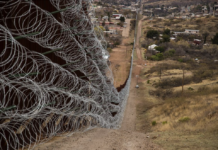
Imagine reliving the civil right movements, when people were in resisting due to oppression. If you would have to go through it again, how far would you go for your rights?
In Venezuela students and civilians have been fighting for their rights for the past few weeks.
According to lapatilla.com the National Guard have been ruthlessly controlling the protest.
“Human rights are being violated since the first time they [government] changed in a arbitrary way the constitution of Venezuela in a polarized Congress,” Venezuelan Raul Urbina, former entertainment reporter for CNN in Spanish, said.
According to Ivan Rodriguez, Venezuelan Law Clerk in Espinoza Law Offices, Venezuela has one of the most modern constitutions that protect human rights.
Some of these rights are: the right to life, freedom of speech, right to due process and to obtain a prompt decision and right for protest.
These past days reports of death has increased during the marches.
“There is an unfortunate balance of 13 dead and over 100 injured, according to official figures. In addition to about 400 arrests,” Rodriguez said. “Have reported torture, physical and psychological abuse.”
In Ukraine the same experience took place in their country.
“They [government] definitely violated the human rights, they started to shoot people in the streets that were protesting, apparently Viktor Yanukovych [the former Ukranian president] gave that order,” FSC Ukrainian Vladimir Barabash said.
Barabash believes that without those people who give their lives to fight for their rights there would be no change by now.
Yanukovych is still missing and there is a warrant arrest against him according to CNN.
“We owe it to them for the peace coming into our country,” Barabash said.
The Venezuelan government has failed to assure the right for living.
“In 2013 there were more than 24,000 homicides in the country without the government doing the necessary and essentials to protect the physical integrity of people,” Rodriguez said.
Also, the media has censored them selves to avoid being punished by the Venezuelan government.
Rodriguez said that the government owns most of the media and they refuse to grant currencies to newspapers so they can obtain raw material for production. Newspapers had to cut pages or to even shutdown the company.
According to CNN, President Nicolas Maduro will expel the broadcast channel from Venezuela if they do not “rectify” its coverage of the protests.
“It is a signal of fear from the government that our channel shows both sides of the history,” Urbina said. “The world is finding out what is really happening.”
Venezuela’s situation has been ignored by international organizations such as United Nations.
“I think is because there is a big economic interest. Venezuela has major oil reserves in the world. However, we have seen the statements of Human Rights Watch,” Rodriguez said.
According to hrw.org Venezuela is applying classic tactics of an authoritarian regime, throwing into jail its opponents, media black out and intimidating civil society.
Rodriguez mentioned that two U.S. Congressmen Mario Diaz-Balart and Ileana Ros-Lehtinen announced they will promote sanctions to those who are responsible of the human right violations.
“Legislation [U.S.] seeks to block visas, property purchases and financial transactions to those who have been associated with repression of the protests,” Rodriguez said.
Till now Venezuelans are still in the streets fighting for their rights.
“I would tell them [students] to keep going. You are not alone. The best political movements that have changed history of other countries come from the students,” Urbina said.
Urbina said that they are young people with desire to fight, live and chase a future.
Photo courtesy of Offir Michieli







